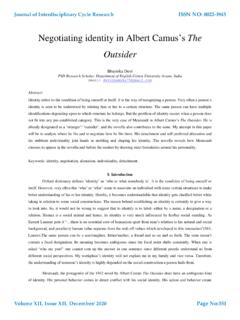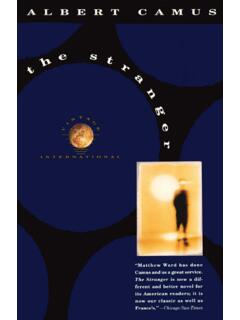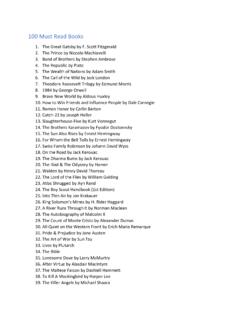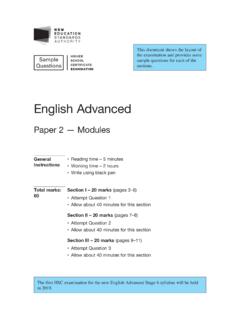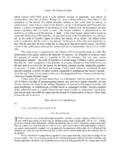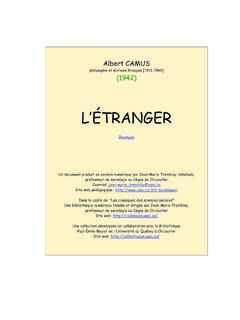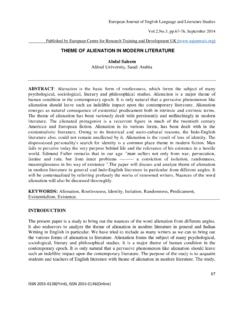Transcription of Camus - The Myth of Sisyphus and Other Essays v1.1
1 The Myth Of Sisyphus And OtherEssaysAlbert CamusTranslated from the French by Justin O Brien1955 ContentsPrefaceThe Myth Of SisyphusAn Absurd ReasoningAbsurdity and SuicideAbsurd WalkPhilosophical SuicideAbsurd FreedomThe Absurd ManDon JuanismDramaConquestAbsurd CreationPhilosophy and FictionKirilovEphemeral CreationThe Myth Of SisyphusAppendix: Hope and the Absurd in the Work of FranzKafkaSummer In AlgiersThe Minotaur or The Stop In OranThe StreetThe Desert in OranSportsMonumentsAriadne s StoneHelen s ExileReturn To TipasaThe ArtistAnd His TimePrefaceFor me The Myth of Sisyphus marks the beginning of an ideawhich I was to pursue inThe attempts to resolve theproblem of suicide, asThe Rebelattempts to resolve that ofmurder, in both cases without the aid of eternalvalues which,temporarily perhaps, are absent or distorted in contemporaryEurope.
2 The fundamental subject of The Myth of Sisyphus isthis: it is legitimate and necessary to wonder whether life has ameaning; therefore it is legitimate to meet the problem of suicideface to face. The answer, underlying and appearing through theparadoxes which cover it, is this: even if one does not believe inGod, suicide is not legitimate. Written fifteen years ago, in 1940,amid the French and European disaster, thisbook declares thateven within the limits of nihilism it is possible to find the means toproceed beyond nihilism. In all the books I have written since,Ihave attempted to pursue this direction.
3 Although The Myth ofSisyphus poses mortal problems, it sums itself up for me as alucid invitation to live and to create, in the very midst of the has hence been thought possible to append to thisphilosophical argument a series of Essays , of a kindIhave neverceased writing, which are somewhat marginal to my Other a more lyrical form, they all illustrate that essential fluctuationfrom assent to refusal which, in my view, defines the artist and hisdifficult calling. The unity of this book, that I should like to beapparent to American readers as it is to me, resides in thereflection, alternately cold and impassioned, in which an artistmay indulge as to his reasons for living and for creating.
4 Afterfifteen years Ihave progressed beyond several of the positionswhich are set down here;but I have remained faithful, it seems tome, to the exigency which prompted them. That is why this hook isin a certain sense the most personal of those I have published inAmerica. More than the others, therefore, it has need of theindulgence and understanding of its readers. albert Camus , Paris, March 1955for PASCAL PIAOmy soul, do not aspire to immortal life, but exhaust the limitsof the possible. Pindar,PythianiiiThe pages that follow deal with an absurd sensitivity that canbe foundwidespread in the age and not with an absurdphilosophy which our time, properly speaking, has not known.
5 It istherefore simply fair to point out, at the outset, what these pagesowe to certain contemporary thinkers. It is so far from my intentionto hidethis that they Will be found cited and commented uponthroughout this it is useful to note at the same time that the absurd, hithertotaken as a conclusion, is considered in this essay as a starting-point. In this sense it may be said that thereis somethingprovisional in my commentary: one cannot prejudge the position itentails. There will be found here merely the description, in the purestate, of an intellectual malady. No metaphysic, no belief isinvolved in it for the moment.
6 These are thelimits and the onlybias of this book. Certain personal experiences urge me to makethis Myth Of SisyphusAn Absurd ReasoningAbsurdity and SuicideThere is but one truly serious philosophical problem, and thatis suicide. Judging whether life is or is not worth living amounts toanswering the fundamental question of philosophy. All the rest whether or not the world has three dimensions, whether the mindhas nine or twelve categories comes afterwards. These aregames; one must first answer. And if it is true, as Nietzsche claims,that a philosopher, to deserve our respect, must preach by example,you can appreciate the importance of that reply, for it will precedethe definitive act.
7 These are facts the heart can feel; yet they callfor careful study before they become clear to the I ask myself how to judge that this question is more urgentthan that, I reply that one judges by the actions it entails. I havenever seen anyone die for the ontologi-cal argument. Galileo, whoheld ascientific truth of great importance, abjured it with thegreatest ease as soon as it endangered his life. In a certain sense, hedid right.[1]That truth was not worth the stake. Whether the earthor the sun revolves around the Other is a matter of profoundindifference. To tell the truth, it is a futile question. On the otherhand, I see many people die because they judge that life is notworth living.
8 I see others paradoxically getting killed for the ideasor illusions that give them a reason for living (what is called areason for living is also an excellent reason for dying). I thereforeconclude that the meaning of life is the most urgent of to answer it? On all essential problems (I mean thereby thosethat run the risk of leading to death or those that intensify thepassion of living) there are probably but two methods of thought:the method of La Palisse and the method of Don Quixote. Solelythe balance between evidence and lyricism can allow us to achievesimultaneously emotion and lucidity. In a subject at once sohumble and so heavy with emotion, the learned and classicaldialectic must yield, one can see, to a more modest attitude of mindderiving at one and the same time from common sense has never been dealt with except as a socialphenomenon.
9 On the contrary, we are concerned here, at the outset,with the relationship between individualthoughtand suicide. Anact like this is prepared within the silence of the heart, asis a greatwork of art. The man himself is ignorant of it. One evening hepulls the trigger or jumps. Of an apartment-building manager whohad killed himself I was told that he had lost his daughter fiveyears before, that be bad changed greatly since, andthat thatexperience had undermined him. A more exact word cannot beimagined. Beginning to think is beginning to be has but little connection with such beginnings.
10 The wormis in man s heart. That is where it must be sought. One must followand understand this fatal game that leads from lucidity in the faceof existence to flight from are many causes for a suicide, and generally the mostobvious ones were not the most powerful. Rarely is suicidecommitted (yet the hypothesis is not excluded) through sets off the crisis is almost always unverifiable. Newspapersoften speak of personal sorrows or of incurable illness. Theseexplanations are plausible. But one would have to know whether afriend of the desperate man had not that very day addressed himindifferently. He is the guilty one.



